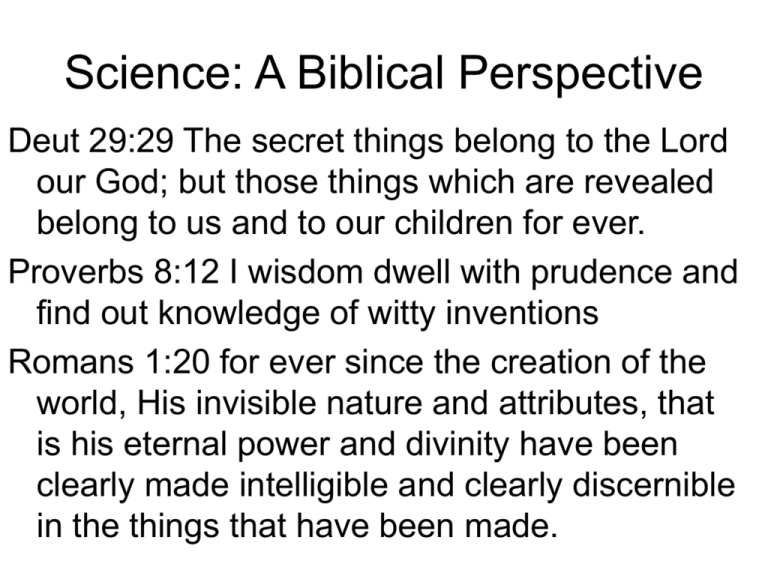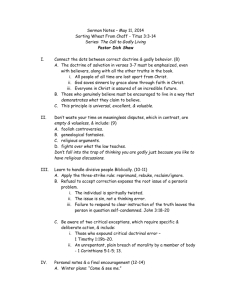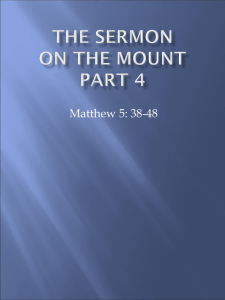PowerPoint
advertisement

Science: A Biblical Perspective Deut 29:29 The secret things belong to the Lord our God; but those things which are revealed belong to us and to our children for ever. Proverbs 8:12 I wisdom dwell with prudence and find out knowledge of witty inventions Romans 1:20 for ever since the creation of the world, His invisible nature and attributes, that is his eternal power and divinity have been clearly made intelligible and clearly discernible in the things that have been made. Leonhard Euler (1707-1783) Important Scientific Achievements • Learned Greek, Hebrew, Swiss, Russian languages • Develop mathematical works on algebra, dioptics, navigation, lunar motion, buckling theorem, calculus of variations, continuum mechanics, complex variables, differential geometry, topology, graph theory, combinatorics, acoustics, and musical harmony. • Approximately 1/3 of all publications in math, physics, and mechanics between 1700-1800 were authored by Euler • Over 800 writings, currently a 73 volume document (many of the writings are over 500 pages) were started in 1912 and are yet as incomplete Leonhard Euler Personal Notes • Had 13 children and only 3 survived him • Was completely blind the last 17 years of his life and wrote more over that period than before • Worked with Bernoulli brothers in his early years • Was an avid Christian apologist participating in many theological debates with the French “Free Thinkers” On the Creator • …infinitely more worthy of the almighty Creator who formed it. The government of the universe will, likewise, ever inspire us with the most sublime idea of the sovereign wisdom and goodness of God • …the eye alone being a masterpiece that far transcends the human understanding, what an exalted idea must we form of Him who has bestowed this wonderful gift, and that in the highest perfection, not on man only, but on the brute creation, nay, on the vilest of insects! On Admission of a All Knowing Creator • Though we are very short of a perfect knowledge of the subject (the creation), the little we do know of it is more than sufficient to convince us of the power and wisdom of the Creator • We discover in the structure of the eye perfections which the most exalted genius could never have imagined On Inspiration of the Bible • The Holy Scriptures not only provides those who are seriously concerned with the improvement of their hearts with the most powerful means to that end, but that it also leads them in time to a greater knowledge of God. • Such a revelation to men would contribute much more to their destruction than to their salvation, since such a greater knowledge of God would increase the duties which are our responsibilities, and the neglect of these duties would lead to the guilt of an even greater offense. On Jesus Christ • The apostles and many early Christians unanimously claimed that Christ not only had risen from the dead, but that they themselves had seen him and that they had even spoken with him. That they did not truly believe this themselves and that beneath it there was hidden deceit on their part cannot be asserted by any man with the least light who would weigh their doctrine with some attention and take into consideration their attested consistency. That the apostles should have falsely imagined this through an insane understanding can even less be affirmed in any likelihood. Or else one would have to assert that God has miraculously blinded all these men and this only to spread a false doctrine. On Inconsistent Thinking Against the Bible • They behave in the most unfair and irresponsible way toward this Book when they dare to absolutely deny any value to it because of some (apparent to them) irreconcilable difficulties. Most of these people will have to admit that they are not able to resolve the difficulties mentioned above against geometry, against the existence of bodies and against the possibility of motion, and yet it has not come to the mind of even one of them to reject the truth and reality of these things….Now, since such great and important difficulties, yes, even apparent contradictions as it were, can be adduced against those things which can be recognized by reason alone; so there must be at least equally great difficulties in revealed doctrines, which cannot be arrived at by reason. Consequently, one has even far less reason to take exception to them. On the Invisible Soul • The powers of the soul are manifested in a twofold set of faculties, one called the mind, the other the will. Now since all blissful happiness consists in perfection, the blissful happiness of a soul cannot be promoted except through the perfection of the mind and the perfection of the will. Therefore, a soul is to be reckoned the happier the further it has brought the mind as well as the will to perfection. On the Will of God • To scripture belongs in particular the doctrine of both general as well as particular divine providence, through which we can recognize that we can never get into any circumstance where God did not expressly place us according to his infinite wisdom and goodness, and can come the firm assurance that not a single hair may fall from our head without the will of our heavenly Father. Now if only we were to ponder this doctrine with the appropriate attention and apply it to ourselves, we would submit to the will of God under all circumstances without difficulty and even with pleasure and in this way attain true happiness On the Will of God • Now since our happiness is directed toward God as our greatest good, it follows that the violation of the law must necessarily plunge us into the most extreme perdition. How could God conceivably prescribe law to reasonable creatures without demanding their fulfillment in full earnest and emphatically punishing the transgressors? Therefore, man must strive with all his powers to bring his will to observe the whole law prescribed to him by God and to put himself in such a state of mind that he does it with joy and finds his greatest satisfaction therein. On Nature • We must acknowledge the government and providence of God, who having from all eternity all the counsels, the projects, and voluntary actions of men, arranged the corporeal world in such a manner, that it brings about, at all times, circumstances which cause these enterprises to fail, or to succeed, according as His infinite wisdom judges to be most fit. God thus remains absolute sovereign of all events, notwithstanding the liberty of men, all whose actions, though free, are, from the beginning, part of the plan which God intended to execute, when He created his universe. On Revelation Knowledge • If we are liable to weaknesses and inconsistencies so humiliating, in our researches into the phenomena of this visible world, which lies open to the examination of our senses, how wretched must we have been, had God left us to ourselves with respect to things invisible, and which concern our eternal salvation? On this important article, a revelation was absolutely necessary to us; and we ought to avail ourselves of it, with the most profound veneration. On Christ’s Resurrection from the Dead • It is therefore a settled truth that Christ is risen from the dead: since this such a marvel, which could only be performed by God alone, it makes it impossible to cast any doubt on the divine sending of Christ into this world. Consequently, the doctrine of Christ and of his apostles is divine and since it is directed toward our true happiness, we can therefore believe with the strongest confidence all the promises which have been made in the gospel regarding this life as well as the one to come, and view the Christian religion as a divine work aiming at our spirituality. But it is not necessary to elaborate further on all this, since each one who is convinced only once of the resurrection of the Christ cannot doubt any further the divinity of Holy Scripture. On the Love of God • The holy life of the apostles, and of the other primitive Christians, appears to me an irresistible proof of the truth of the Christian religion. If true happiness consists in union with the Supreme Being, which it is impossible for a moment to doubt, the enjoyment of this happiness necessarily requires, on our part, a certain disposition, founded on a supreme love to God, and the most perfect charity toward our neighbor…









